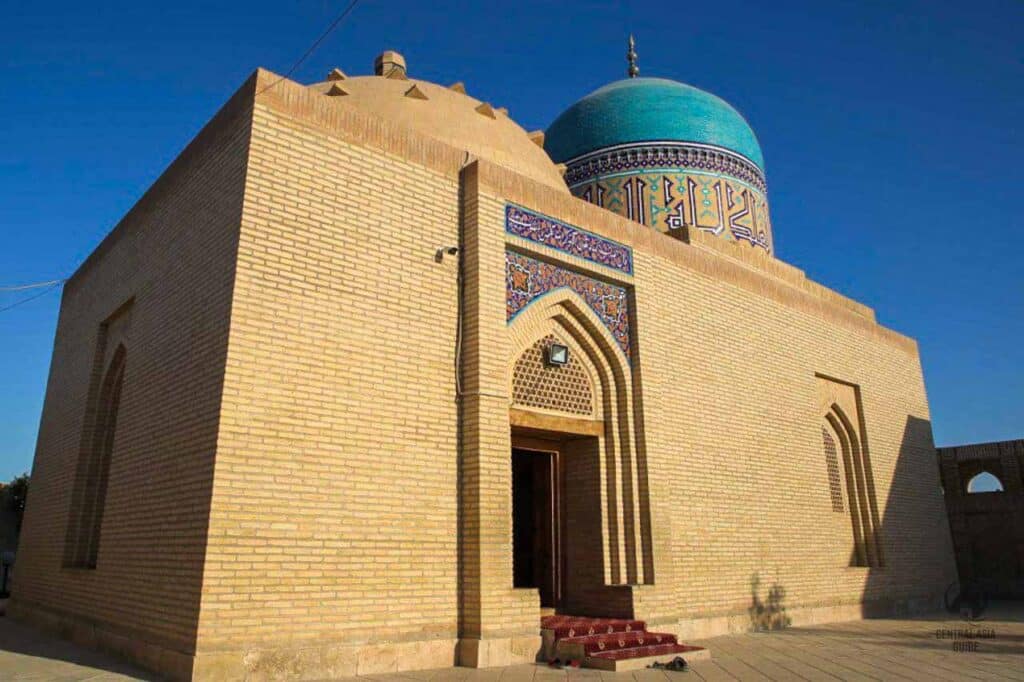Amir Kulal Mausoleum
Amir Kulal Mausoleum
The Amir Kulal Mausoleum is a sacred Sufi site situated in the town of Kagan, near Bukhara. It carries the memory of Amir Kulal, a 14th-century Sufi master well known as the spiritual teacher of Baha-ud-Din Naqshband, the founder of the influential Naqshbandi Sufi order. Amir Kulal, intially known for his wrestling skills and craftsmanship, later commited his life to spiritual teaching and became very respected for his wisdom, humility, and well understanding of Sufism.
Amir Kulal Mausoleum is located 25 km east of Bukhara in the village of Yangikhayat. Said Amir Kulal was a respected representative of the spiritual and intellectual life of 14th-century Bukhara. He is also known as Hodjagan Amir Kulal (ca.1281-1370) Sufi school spiritual authority, the famous scientist-mystic. He was a disciple of Muhammad baba Sammasi (died in 1354). Amir Kulal had more than one hundred students, the most famous of which was Bahauddin (Baha’ad-din) Naqshband whose mausoleum is located not far.
The Amir Kulal sheikh, who is from the village of Sukhor near Bukhara, belonged to the Khojagan Sufi school and was an expert on the philosophical works of Plato and Aristotle. He also authored Sufi tracts and was known as an outstanding mentor. Born in 1278, Kulal was fond of wrestling in his youth and earned the attention of the famous Sheikh Muhammad Baba Samasi. Thanks to his outstanding abilities and his desire for knowledge and spiritual development, Amir Kulal was honored as not only the student of Samasi, but also his heir. Samasi appointed Kulal to be the mentor of Bahauddin Naqshbandi, founder of the famous Naqshbandi Sufi Muslim order. He also introduced Kulal to the society of Khojagan dervishes and instructed him in the laws of the mystical path and the mystery of zikr ( means “remembrance, reminder” or “mention, it is phrases or prayers that are repeated in Sufi Islam)

According to different sources, Sheikh Said Amir Kulal was the first spiritual mentor of Amir Timur, whom he possibly first met in 1363. As a true Sufi, Amir Kulal devoted extensive time not only to the spiritual growth of his followers but also to craftsmanship, for he believed that only by creating can one approach the divine.
The Sheikh’s family had been engaged in pottery since ancient times and the name “Kulal” actually means “potter”. Amir Kulal is widely considered the patron saint of pottery and the spiritual mentor of potters.
The Sufi scholar died in 1370, and today the Mausoleum of Amir Kulal remains a holy site for Sufis and potters, the latter of whom consider a pilgrimage to the sheikh’s grave to be a rite of passage. The small complex includes the important religious sights of Bukhara and consists of a mausoleum, a garden, a mosque and a small minaret. The mosque was built in 1998, while the mausoleum was built in 2007 on the site of a modest grave.
Amir Kulal’s tomb has become a popular pilgrimage destination, especially for followers of Sufi Islam. It is also a key stop along the route known as the “Seven Sufi Saints of Bukhara”, a spiritual journey that connects the tombs of prominent Sufi figures in the region. Pilgrims come to offer prayers, reflect, and seek blessings, making the mausoleum a living part of Central Asia’s rich spiritual heritage.
Other sights in or near Bukhara
Page updated 3.6.2025